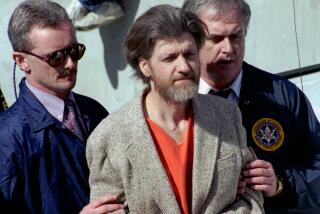Prosecutor Plans to Rely on Kaczynski’s Own Words
- Share via
SACRAMENTO — A federal prosecutor said Wednesday that he plans to make Theodore Kaczynski’s own admissions the cornerstone of his opening statement to jurors in U.S. District Court on Monday.
During a three-hour court hearing in which lead prosecutor Robert Cleary sought approval of that plan, he said Kaczynski has acknowledged his involvement in three of the four attacks he is accused of committing. The four incidents resulted in two deaths and two serious injuries.
Kaczynski has pleaded not guilty.
Cleary characterized the admissions, allegedly in Kaczynski’s own writings, as the “most persuasive” evidence of the reclusive mathematician’s “culpability.”
When he makes his opening statement Monday, Cleary further plans to tell jurors that the reclusive woodsman formed the intent to commit a nationwide string of bombings as long ago as 1971. The prosecutor said Kaczynski’s writings also offer details about a dozen other bomb attacks that he is not charged with in Sacramento.
In outlining his case, Cleary also disclosed that Kaczynski made observations in his writings about the injuries received by victims of these attacks and noted his own reaction.
Cleary did not spell out further details of Kaczynski’s alleged thoughts on the bombings. He spoke only generally about what was reflected in Kaczynski’s journals.
U.S. District Court Judge Garland E. Burrell did not issue a ruling Wednesday.
Prosecutors previously have said that Kacyznski’s journals and diaries will form the backbone of their case against the man they say was the elusive killer. They hadn’t indicated, however, exactly what they would tell the jury.
Defense attorney Judy Clarke vigorously objected to Cleary’s plans, saying that he could make an effective case using other, apparently less graphic, statements from her 55-year-old client, who was not present in court Wednesday.
Prosecutors and defense attorneys did tell Burrell that they had agreed to inform jurors about the 12 bombings that are not among charges against Kaczynski. Prosecutors want to cite these other attacks to show a criminal pattern that allegedly began in 1978.
Clarke said that as a consequence the prosecution will need to call fewer witnesses. She said it will “dramatically reduce the length of the trial.”
Prosecutors, who had previously said their case could take two months, now estimate that it will last about a month.
In another development, Burrell declined to reveal further details of closed-door conversations that he recently had with Kaczynski and his attorneys.
Heavily censored transcripts of the meetings suggest that Kaczynski was disgruntled with his attorneys, possibly their efforts to raise his mental illness. On Wednesday, Burrell indicated in a passing reference that Kaczynski may have sought to represent himself. The judge offered no further explanation.
Burrell confirmed that the attorney-client troubles have been ironed out. Now, he said Kaczynski’s dealings with his attorneys “reflect a renewed and amicable attorney-client relationship.”
Burrell also said the issue of Kaczynski’s competence had been raised but that he had never questioned the defendant’s competence to stand trial.
Kaczynski was arrested in April 1996 by FBI agents at his cabin in Montana.
More to Read
Sign up for Essential California
The most important California stories and recommendations in your inbox every morning.
You may occasionally receive promotional content from the Los Angeles Times.












